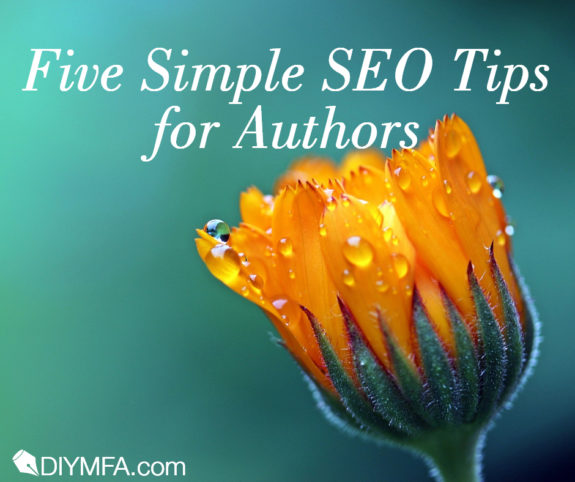If you already have a blog on your author website (or are thinking about starting one), you might have heard of Search Engine Optimization (SEO). And if you’re anything like I used to be, you might be freaking out a little bit over it.
So, what is SEO?
SEO isn’t just for big, shiny businesses anymore (and it certainly doesn’t have to be complicated either)! Simply put, SEO is an organic way for websites to gain more quality traffic.
Authors who utilize good SEO practices can drive traffic to their website and increase book sales and email newsletter signups. SEO can definitely be overwhelming at first, so here are five simple tips to get you started.
1) Do Your Research
Keyword research is, well…key…to developing content that attracts readers. Choosing focused keywords can help you take your blog from zero views to thousands of views. But, how do you know which keywords to include in your website content? Ideally, you’ll want to pick a keyword that isn’t too broad and one that you can most easily rank for.
So, let’s say I’m the author of a couple of chick lit books and I’m writing a blog post about my writing process. Which keywords should I use? “How to write a novel” is way too broad. There are thousands and thousands of people out there who already write blog posts using those exact keywords. But, what if we got more specific? How about “How to write chick lit?”
That’s way more specific and it’s targeting people who are interested in the exact genre I write. So, I’m off to a good start!
Next, you’ll want to research your chosen keywords. One easy way to do this is to use a website like Keyword Tool. While the free version doesn’t show you the search volumes for each term, you can still get a pretty good idea of what’s ranking just by looking at how many phrases show up in the search results.
For example, if you type in “how to write chick lit” into the Keyword Tool search bar, you’ll see that there aren’t a lot of results. But that isn’t necessarily a bad thing! Fewer results generally mean you have a better chance of ranking for that keyword.
You can also type your keyword phrase into Google to see what pops up. Which websites are you competing against? Are there millions and millions of blogs using the exact same keywords you’re using? If so, you might want to consider narrowing your focus.
2) Don’t Keyword Stuff
Keyword stuffing is a big no-no in SEO Land. Keyword stuffing is basically when someone tries to manipulate search engine results by “stuffing” as many keywords into a website or post as possible (these often look very unnatural and spammy).
Ideally, you’ll want to incorporate your keyword naturally into your content at least 2-3 times. Additionally, it should appear once in your title, once in a header, and once in your meta description (and there is an awesome free tool that can help you track this, which I will discuss later).
Again, using keywords as naturally as possible here is very important. Don’t try to force keywords if it sounds unnatural. Your readers will notice.
3) Create Genuinely Helpful Content
You can have the best keywords in the world, but they won’t do much if your content isn’t actually helpful.
Continuing with my chick lit author example, what kind of blog posts would I want to create to drive more quality traffic to my site? I could write articles about my specific writing process (i.e. How to write chick lit). Around the holidays, I might want to put together a gift guide of the top chick lit books to give as gifts (and of course include my own book on there!).
The sky’s the limit when you’re creating content for your blog. You just need to make sure it’s relevant to your audience (i.e. people who love to read and write chick lit).
4) Use Free Tools Like Yoast SEO
Yoast SEO is a free WordPress plugin (there is a paid option, however, the free option has worked wonders for me in the past).
One of Yoast SEO’s most helpful features is that it “rates” your blog post on how well it meets good SEO standards. This feature is useful if you aren’t quite familiar with good SEO practices now, or forget some of the basics. There is also a section where you can update your page’s title tag and meta description (great opportunities to include your keyword!).
5) Don’t Be Afraid to Experiment
Don’t be afraid to experiment with different keywords on your website. Which posts drive the most traffic? Which posts have the most engagement? See if you can expand on them. And if something doesn’t work, try something else!
I’m not going to lie, seeing results from your SEO efforts does take time. However, if you’re already posting consistently (or have several articles already written), it’s very simple to optimize your pages after the fact.
Back to you, writers! Are you using SEO on your website? What tips and tricks do you have? Let me know in the comments!
 Manuela Williams is a Las Vegas-based writer and editor. She is the author of Ghost In Girl Costume, which won the 2017 Hard To Swallow Chapbook Contest. Her second poetry chapbook, Witch, is forthcoming from Dancing Girl Press. When she’s not writing, Manuela is busy drinking coffee and spending time with her blind Pomeranian, Redford. You can connect with her on LinkedIn and Pinterest.
Manuela Williams is a Las Vegas-based writer and editor. She is the author of Ghost In Girl Costume, which won the 2017 Hard To Swallow Chapbook Contest. Her second poetry chapbook, Witch, is forthcoming from Dancing Girl Press. When she’s not writing, Manuela is busy drinking coffee and spending time with her blind Pomeranian, Redford. You can connect with her on LinkedIn and Pinterest.







